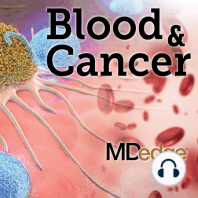21 min listen

COVID-19 vaccine 101: Dr. Drew Weissman discusses mechanisms, efficacy, and vaccinating patients with cancer or HIV
FromBlood & Cancer
COVID-19 vaccine 101: Dr. Drew Weissman discusses mechanisms, efficacy, and vaccinating patients with cancer or HIV
FromBlood & Cancer
ratings:
Length:
24 minutes
Released:
Feb 4, 2021
Format:
Podcast episode
Description
How do the various COVID-19 vaccines work, and when should patients be vaccinated? We tackle these topics and more in this episode. Our host David H. Henry, MD, is joined by Drew Weissman, MD, PhD, a professor at the University of Pennsylvania, Philadelphia. Dr. Weissman codeveloped the messenger RNA (mRNA) technology being used in the COVID-19 vaccines produced by Pfizer/BioNTech and Moderna. History of mRNA vaccines Testing of mRNA vaccines began in the 1990s. An initial problem with these vaccines was that the RNA was highly inflammatory. Dr. Weissman and his colleague, Katalin Karikó, PhD, discovered how to fix that problem in 2005. The pair found that placing modified nucleosides into mRNA made it noninflammatory and allowed for increased production of protein from the RNA – up to a 1,000-fold increase in mice. This technology is the basis of the Moderna and Pfizer/BioNTech COVID-19 vaccines. Immunology and vaccines To produce a good immune response, antigen must be present for a long time, though the optimal amount of time is unknown, Dr. Weissman said. The mRNA lipid nanoparticles (LNPs) used in the COVID-19 vaccines make protein for 10-14 days, resulting in a “great” immune response, according to Dr. Weissman. Most vaccines have an adjuvant, or something that stimulates the immune response by inducing TH1 or TH2 responses. The LNP used in the COVID-19 vaccines is an adjuvant that makes a specialized CD4 helper cell that drives antibody production, increases antibody affinity, and matures antibodies to make long-lived plasma cells to allow for long-lived antibody responses. This is the only adjuvant known that induces these type of helper T cells. COVID-19 vaccine reactions Adverse reactions to COVID-19 vaccination – flu-like symptoms, arm pain, etc. – are caused by the LNP, not the spike protein. Once the LNP is gone, usually within the first 24 hours, symptoms dissipate. The amount of spike protein produced decreases over 14 days. It’s unclear if patients should take NSAIDs to manage symptoms after COVID-19 vaccination, as this hasn’t been tested. However, with influenza vaccination, taking an NSAID will decrease the immune response. Variants and their impact on vaccination SARS-CoV-2 variants have been reported in Brazil, South Africa, California, and the United Kingdom. Dr. Weissman explained that there are two kinds of variation: when a virus learns how to better infect people and when the virus learns to avoid immune responses. Most SARS-CoV-2 variants are equally addressed by the vaccines, though we know vaccines have reduced efficacy against the South African variant, Dr. Weissman said. The good news is that coronavirus mutates very slowly, and it’s easy with mRNA vaccines to “plug in” a mutant and make a more effective vaccine, Dr. Weissman said. Vaccinating cancer patients: Treatment considerations For patients receiving chemotherapy: We don’t know the best time to administer COVID-19 vaccines to patients on chemotherapy, as this hasn’t been studied, Dr. Weissman said. When other vaccines were given to subjects receiving chemotherapy, those vaccines did not work as well. Chemotherapy knocks down myeloid cells around day 7, with recovery typically around day 28. Dr. Weissman said he would probably vaccinate at day 14 in the chemotherapy cycle, as the germinal centers where B cells are produced form about 2-7 days after receipt of the vaccine. For patients receiving checkpoint inhibitors: The optimal time for vaccination in patients receiving checkpoint inhibitors is unknown. However, the immune response to vaccination in patients on checkpoint inhibitors is expected to be similar to the general population or slightly enhanced. For patients receiving anti-CD20 antibodies: Anti-CD20 antibodies might blunt the B-cell response to vaccination. Rituximab, for example, depletes B cells in the circulation for months. In the absence of B cells, there won’t be a good antibody response. T-cell response is a
Released:
Feb 4, 2021
Format:
Podcast episode
Titles in the series (100)
2019 drug approvals in hematology-oncology: , of the University of Pennsylvania, Philadelphia, joins the podcast to discuss noteworthy drug approvals in hematology-oncology in 2019. Dr. Mintzer and Blood & Cancer host, , of Pennsylvania Hospital, Philadelphia, discuss what these new... by Blood & Cancer